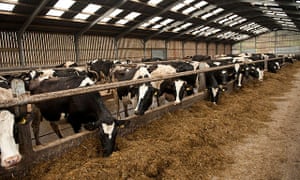
Did you know that three meat companies – JBS, Cargill and Tyson – are estimated to have emitted more greenhouse gases last year than all of France and nearly as much as some of the biggest oil companies like Exxon, BP and Shell?
Few meat and dairy companies calculate or publish their climate emissions. So for the first time ever, we have estimated corporate emissions from livestock, using the most comprehensive methodology created to date by the UN’s Food and Agriculture Organization (FAO).
And before the meat and dairy industries descend upon COP23 to broadcast their “feed the world” narrative, let’s set the story straight: their emissions could lead us to a point of no return.
We’ve found that the top 20 meat and dairy companies emitted more greenhouse gases in 2016 than all of Germany, Europe’s biggest climate polluter by far. If these companies were a country, they would be the world’s seventh largest greenhouse gas emitter.
It’s now clear that the world cannot avoid climate catastrophe without addressing the staggering emissions from the largest meat and dairy conglomerates.
Over the past few decades, the meat and dairy majors have become immensely powerful and have successfully pushed policies to support rapid growth of industrial meat and dairy production and consumption around the world, at all costs.
One consequence, among many, is that livestock production now contributes nearly 15% of global greenhouse gas emissions, even more than the transportation sector. If production continues to grow as projected by the FAO, emissions will escalate to the point where industrial meat and dairy production alone will undercut our ability to keep temperatures from rising to an apocalyptic scenario.
At the upcoming COP23 climate meeting in Bonn, Germany, the world’s largest meat and dairy companies will tell a different story. They’ll explain that their production is necessary for world food security, and that they should therefore be let off the hook, or better yet, get incentives for tinkering with their greenhouse gas emissions.
This is not true.
These companies produce a vast amount of highly subsidized meat and dairy in a handful of countries where these products are already overconsumed. They then export their surpluses to the rest of the world, undercutting the millions of small farmers who actually do ensure food security and bombarding consumers with unhealthy processed foods.
In Bonn, the big meat and dairy companies are also likely to spend much time and money talking about efficiency, while expanding production. They will say that the only way to effectively reduce emissions is by squeezing out ever more milk from each dairy cow or by bringing beef cattle to slaughter ever more quickly.
Such “solutions” would only compound the industry’s horrific treatment of workers and animals and exacerbate the environmental and health crises caused by the industry.
They would also condemn the 600 million small-scale farmers and 200 million herders who depend on livestock for their livelihoods and who do feed billions of people every day with moderate amounts of meat, dairy and eggs. These small producers are the backbone of food systems that can arrest and address climate change. They are the ones who need to be supported and strengthened.
If we are serious about feeding the planet while fighting climate change, the world needs to urgently invest in a transition to food systems that hinge on small-scale producers, agroecology and local markets.
These systems provide for moderate levels of meat and dairy, but they do so in a way that regenerates soils, provides livelihoods to rural and urban communities and makes crops and animals resilient to the vagaries of an unpredictable climate.
The solutions exist; they just need to be urgently implemented. The first step is to redirect public money from factory farming and agribusiness towards small-scale agroecological family farms. Governments should also use their buying power to support small producers, helping them to build jobs and markets for local products.
As numerous cities make energy choices to tackle climate change, so too should municipalities invest in farm-to-hospital and farm-to-school programs that deliver healthier food and strengthen rural communities while emitting fewer greenhouse gases.
It is time to stop the dairy and meat giants from destroying the climate and shift our support to making our small farmers, herders and ranchers resilient.
No comments:
Post a Comment